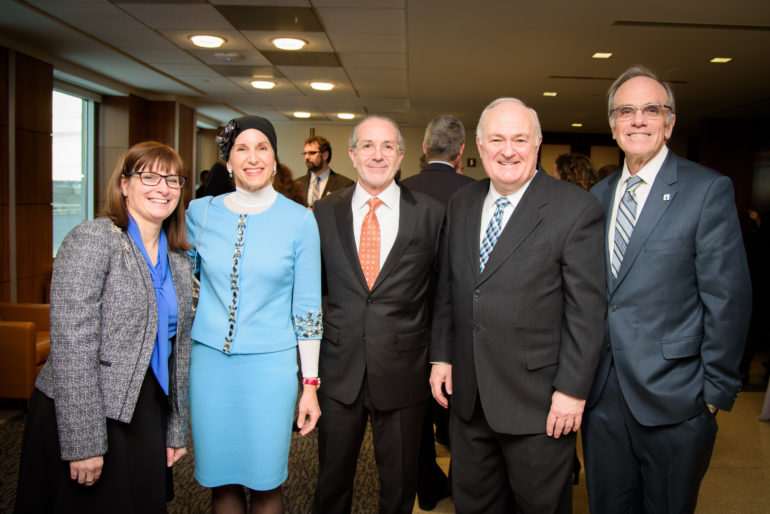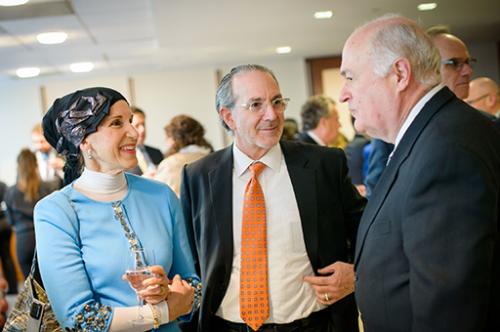THE NEW MAYBERG CENTER for Jewish Education and Leadership—made possible by a generous gift from
the Mayberg Family Foundation—links academic scholarship with the work of Jewish organizations on GW’s campus, throughout Washington, D.C., and nationwide. The center is housed in the Graduate School of Education and Human Development (GSEHD), and will provide graduate professional development, workshops, and public programs in Jewish education with a focus on pedagogy and leadership training. Center Director Erica Brown designs and teaches courses in education and Jewish studies. She is also building a research agenda and connecting Jewish education to GSEHD’s broader interests in multicultural, religious, and pluralist education. Author of 11 books, Brown holds advanced degrees in education and Jewish studies and has held leadership positions in many Jewish nonprofit organizations. She shares some insights into her goals for the center and current partnerships and research initiatives.
What is the Center's mission?
The Mayberg Center has a multifaceted mission. Its most important contribution will be in the academic training of Jewish educators on a graduate level, preparing them for careers in day schools and allowing them to take advantage of the wealth of resources at GSEHD and through programs such as the Master’s degree in Experiential Education and the Jewish Cultural Arts.
The center will also partner with Jewish nonprofits in the ongoing education of its professionals, and will provide Jewish leadership and literacy certificates. The center will also create a platform for academics and nonprofit leaders to be in conversation about issues that matter for the Jewish future. We like to think of it as a bridge between the academy and the community.
In what ways will the center connect the academics to the work of local and campus Jewish organizations?
taught a leadership class for GW Hillel, and we have already started our first collaboration with the Schusterman Foundation (a leadership and service organization for Jewish youth), helping to prepare a group of international nonprofit leaders through an online, 10-part course called “Jewish Values at Work.”
What new courses are being designed and taught through the center?
Currently, I am teaching a required course in GSEHD’s curriculum and pedagogy program, while we develop a new master’s program that we hope to launch in fall 2018. I will also be teaching an introduction to Judaism for undergraduates next semester, through the GW religion department. I hope it will help acquaint me with the kind of students we will be recruiting for a graduate program once we are formally ready to launch.
Can you discuss recent Mayberg events?
On March 15, we held the Mayberg Center launch with a one-day conference: “Re-imagining Jewish Leadership Education.” We brought together a group of academics, practitioners, and conveners. This was followed, in the evening, by a dinner to honor the Mayberg family and to host a conversation between Leon Wieseltier of the Brookings Institution and David Brooks, the New York Times columnist that I moderated on “Education, Integrity and Leadership.”
What is your overall goal for a successful first year with the center?
In addition to teaching, researching, and writing, I have been on a listening tour, trying to get to know colleagues and the educational landscape within GSEHD. I have also been meeting faculty in related departments where there may be a future for collaboration, and I’ve been getting to know students
and understand more about their concerns. I have received a very gracious welcome here, and am very grateful for this remarkable opportunity. I am, above all, appreciative to Louis and Manette Mayberg for their immense and ongoing support and to Dean Michael Feuer, Rob Eisen, chair of the religion department, and Yoni Kaiser-Blueth, the executive director of GW Hillel, for helping to make this personal dream a reality.
To learn more about the Mayberg Center and ways to support its mission, please contact devcomm gwu [dot] edu (subject: Mayberg%20Center%20Philanthropy%20inquiry) (devcomm[at]gwu[dot]edu).
gwu [dot] edu (subject: Mayberg%20Center%20Philanthropy%20inquiry) (devcomm[at]gwu[dot]edu).



